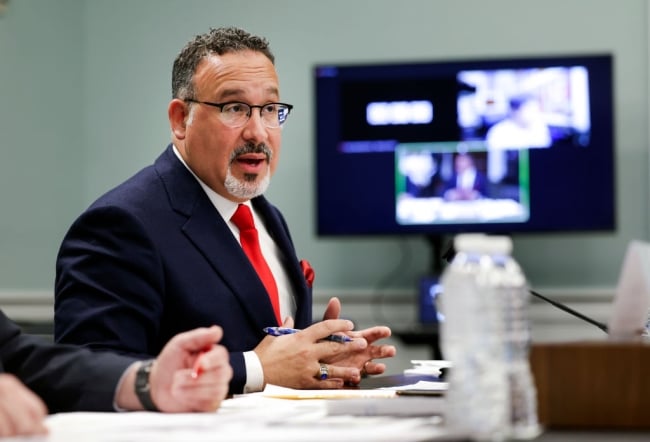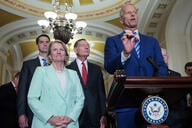You have /5 articles left.
Sign up for a free account or log in.

Education Secretary Miguel Cardona said the new timeline is necessary to “launch a system that works fully and to provide a better experience for students.”
Kevin Dietsch/Getty Images
The Education Department will release the 2025–26 Free Application for Federal Student Aid on Oct. 1 as planned, but only for a limited number of students and institutions, who will test the form and provide feedback.
The department announced Wednesday that it’s planning to slowly open up the application to more participants and then make it available to all by Dec. 1. The phased approach is a shift for the department and will allow it to test the system and address any bugs before opening FAFSA to 17 million students, officials said Wednesday. The changeup was informed by feedback from financial aid and IT experts, higher education and K-12 leaders, and others.
Education Secretary Miguel Cardona has said repeatedly, for months, that he expected the form to launch Oct. 1. But he told reporters in a call that it’s important to adjust the timeline in order to “launch a system that works fully and to provide a better experience for students.”
“Getting this right must be our collective focus,” he said.
The announcement comes after a group of five higher education organizations publicly requested that the department push back the FAFSA’s release to Dec. 1, preferring a fully functional form that launches later to a glitchy application that’s available Oct. 1. The department is planning to process completed applications within a few days, send students’ information along to colleges and allow students to make corrections right away. That would be a change from the 2024–25 cycle, when the department delayed processing until mid-March and students couldn’t correct their applications until April.
Students and colleges are still reeling from the botched rollout of the 2024–25 application, which was revamped at the direction of Congress. Students had to wait much longer than in a typical year to hear from institutions about what financial aid they could receive to pay for college, while others didn’t end up completing the application. For much of the spring, FAFSA submission rates lagged compared to the previous year. In March, 40 percent fewer students had submitted an application, but the department said Wednesday that it has closed that gap to 4 percent.
Still, some colleges have seen fewer students enroll, which has led to some program cuts. Others, particularly small, tuition-dependent colleges, are going door to door to recruit students for the coming academic year.
FAFSA executive adviser Jeremy Singer, a College Board executive brought in earlier this summer to oversee the development and launch of this year’s application, said on the call with reporters the phased approach will “allow us to robustly test the system, which was not possible this past year” and is in line with industry standards. The department will invite volunteers to fill out the form, and more information about how that will work will be released later. Singer expects the FAFSA will be open to hundreds of students at first, and then thousands in October. By November, tens of thousands of students will be testing the form.
“Throughout the testing period, we will share regular updates with all stakeholders so they can have a view into our progress and increase confidence in the process,” he said. “This extended testing period will enable us to ensure the FAFSA is as stable and as user-friendly as possible, enabling more students to complete the application quickly and take the first and most important step towards college affordability.”
The phased approach is one of several changes underway to address issues related to the bungled launch of the 2024–25 form. Cardona said Wednesday that the challenges with the launch were “rooted in a Federal Student Aid department that was also in desperate need of modernization.” In response to concerns about the Office of Federal Student Aid, which oversees the application and disburses aid, Cardona said, “we acted with new leadership and an organizational overhaul.”
Since May, the department has been conducting a “full-scale review” of Federal Student Aid. Updates about organizational changes at the agency will be shared in the coming weeks and months, Cardona said.
“FSA will be more accountable, more efficient and transparent for students, families and all stakeholders,” he said. “It includes changes in FSA operations, oversight and transparency. We’ve also tightened our accountability on contractors to hold everyone accountable for producing quality deliverables on time.”
‘Difficult Trade-Off’
While the phased approach for the 2025–26 form could mean more hiccups for students and institutions, financial aid professionals and college access groups are generally pleased with the department’s decision and the timing of the announcement, which gives them time to plan.
“We acknowledge this is a difficult trade-off between functionality and the release date,” Kim Cook, CEO of National College Attainment Network, said in a statement. “We appreciate the certainty and transparency that this announcement provides to the college access field. Counselors and educational leaders can now plan their FAFSA support strategies with the understanding that students who complete the form will receive financial aid awards in a timely manner.”
Beth Maglione, interim president of the National Association of Student Financial Aid Administrators, said in a statement that it’s encouraging the department is listening to input from her organization and others. (NASFAA and NCAN were among the groups that called for the later launch date.)
“The fact that we are still, to this day, dealing with the aftershocks of this year’s FAFSA rollout shows just how imperative it is that the process is thoroughly tested from end to end and launched as a system, not in a piecemeal manner,” Maglione said. “We all want this year’s FAFSA rollout to work for students and schools, and urge the Department to keep the lines of communication open with the financial aid community so that we can plan appropriately, provide accurate advice and assistance to students, and help troubleshoot issues as needed.”
Congressional Republicans blasted the decision on Wednesday. Last month, a House committee advanced legislation that would have required the department to launch the FAFSA by Oct. 1. The bill has yet to move forward, though, and Congress won’t meet again until early September.
“Needing yet another delay to ‘fix’ issues for the second consecutive year reveals yet another layer of the Department’s mismanagement of FAFSA these past four years,” said Representative Virginia Foxx, the North Carolina Republican who chairs the House education committee, in a statement. “Clear communication has been sorely lacking and should be the bare minimum going forward. I’ll continue fighting for transparency and accountability until a complete and ready FAFSA actually materializes.”



